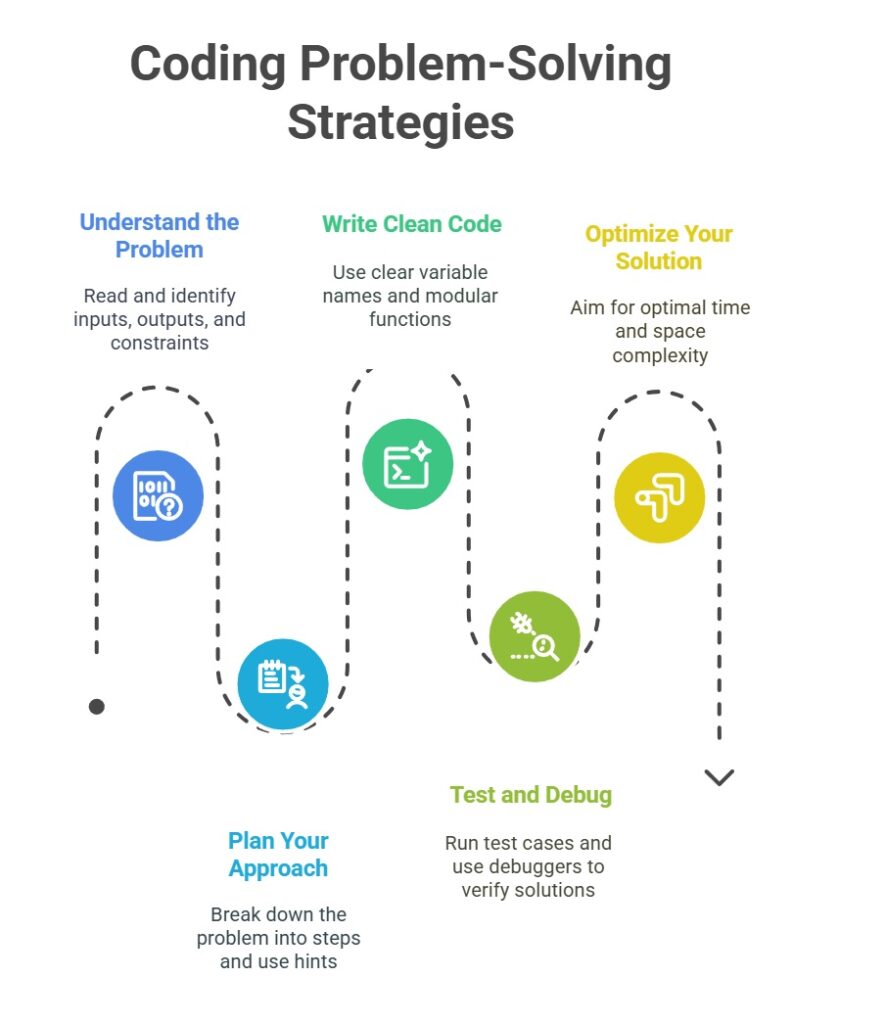Table of Contents
- Why LeetCode and HackerRank Are Must-Haves for Coding Interviews
- Understanding LeetCode and HackerRank: Key Features
- LeetCode vs HackerRank: Which Is Right for You?
- Step-by-Step Strategies to Solve Coding Problems
- How to Combine LeetCode and HackerRank for Maximum Success
- Common Pitfalls to Avoid
- FAQ
- Conclusion
Learn how to solve coding interview problems with LeetCode and HackerRank’s free tools. Boost your prep for FAANG interviews with expert tips and strategies.
Imagine you’re in a coding interview, staring at a whiteboard, with a FAANG recruiter waiting for you to crack a tricky algorithm. The clock’s ticking, but you’re calm because you’ve practiced on the right tools. LeetCode and HackerRank, two powerhouse platforms, offer free resources to help you master coding interviews without spending a dime. In this guide, we’ll show you how to solve coding interview problems with LeetCode and HackerRank, sharing actionable strategies, real-world examples, and a step-by-step guide to using LeetCode and HackerRank for coding interview preparation.
With tech companies like Google and Amazon receiving over 2 million applications annually (Glassdoor, 2023), standing out requires smart prep. Whether you’re tackling data structures and algorithms interview prep or aiming for company-specific coding questions on LeetCode, this blog will equip you with the tools and know-how to succeed. Let’s dive into the free coding interview platforms that can transform your interview game in 2025.
Why LeetCode and HackerRank Are Must-Haves for Coding Interviews
Coding interviews test your ability to solve problems under pressure, often requiring mastery of algorithms, data structures, and clear communication. Free coding interview platforms like LeetCode and HackerRank simulate these conditions, offering thousands of problems and realistic practice environments. A 2024 LeetCode survey found that candidates who practiced 100+ problems were 60% more likely to pass FAANG interviews, highlighting the power of consistent practice.
Statistic: LeetCode’s 2025 data shows that 75% of users who solved medium-to-hard problems improved their problem-solving speed by 40%.
LeetCode excels at company-specific coding questions and mock interviews, while HackerRank shines with timed challenges and skill certifications. Together, they cover the full spectrum of coding problem-solving strategies for interviews. Let’s break down their features and how to use them effectively.
Understanding LeetCode and HackerRank: Key Features
LeetCode: The Go-To for FAANG Prep
LeetCode coding interview preparation is a favorite among engineers for its vast problem library and company-tagged questions (e.g., “Amazon Top 50”).
- Free Features:
- Thousands of free problems (easy to hard) covering arrays, trees, dynamic programming.
- LeetCode mock interviews with timed simulations.
- Discussion forums for community solutions.
- Problem filters by company, topic, or difficulty.
- Best For: FAANG prep, data structures and algorithms interview prep.
- User Story: Maya, a bootcamp grad, solved 120 LeetCode problems over 6 weeks, focusing on Google-tagged questions, and landed an internship in 2024.
HackerRank: Timed Challenges and Certifications
HackerRank interview practice tools emphasize real-world coding scenarios and HackerRank skill certifications to showcase expertise.
- Free Features:
- Extensive problem library with timed challenges.
- Company-specific tracks (e.g., Goldman Sachs prep).
- Free certifications in Python, Java, and SQL.
- Leaderboards for competitive practice.
- Best For: Timed coding practice, coding challenge practice for beginners.
- Case Study: Sam used HackerRank’s Python certification to stand out in a Microsoft interview, securing a junior developer role in 2025.
Trend: In 2025, HackerRank certifications are increasingly valued by recruiters for validating skills, per a Medium post.
LeetCode vs HackerRank: Which Is Right for You?
Choosing between LeetCode vs HackerRank for interviews depends on your goals. Here’s a LeetCode and HackerRank comparison:
| Platform | Strengths | Weaknesses | Best For |
|---|---|---|---|
| LeetCode | Company-specific questions, mock interviews, large problem set | Steeper learning curve for beginners | FAANG and advanced prep |
| HackerRank | Timed challenges, skill certifications, beginner-friendly | Fewer company-specific questions | Beginners and certification seekers |
Key Differences:
- LeetCode is ideal for deep algorithmic practice and company-specific coding questions on LeetCode, with a focus on FAANG-level difficulty.
- HackerRank excels for timed practice and certifications, making it great for showcasing skills to recruiters.
User Insight: A 2025 Reddit thread noted that LeetCode’s problems are often harder, with 30% of users finding its medium problems equivalent to HackerRank’s hard ones.
Pro Tip: Use LeetCode for FAANG prep and HackerRank for certifications and timed practice to cover all bases.
Step-by-Step Strategies to Solve Coding Problems
To solve coding interview problems with LeetCode and HackerRank, follow these coding problem-solving strategies for interviews:
- Understand the Problem
Read the problem twice, identifying inputs, outputs, and constraints. Example: For LeetCode’s “Two Sum,” clarify that you need to return indices of two numbers summing to a target.
Tip: Write down edge cases (e.g., empty arrays, duplicates) before coding. - Plan Your Approach
Break the problem into steps (e.g., loop through array, use hash map). Use LeetCode’s hints or HackerRank’s test cases to guide your thinking.
Case Study: Priya used LeetCode’s discussion forums to learn hash map solutions, cutting her solve time by 20%. - Write Clean Code
Use clear variable names and modular functions. Example: In HackerRank’s “Array Manipulation,” modularize prefix sum logic for readability.
Statistic: A 2023 Interviewing.io study found that clear code explanations boosted interview scores by 25%. - Test and Debug
Run test cases on both platforms to catch errors. Use LeetCode’s debugger or HackerRank’s custom inputs to verify solutions.
Tip: Test edge cases manually (e.g., large inputs, boundary values). - Optimize Your Solution
Aim for optimal time and space complexity (e.g., O(n) vs O(n²)). Example: Optimize LeetCode’s “Longest Substring Without Repeating Characters” using a sliding window.
Trend: In 2025, FAANG interviewers prioritize optimized solutions, per tech blogs.

Pro Tip: Practice explaining your solution aloud, as communication is key in interviews.
How to Combine LeetCode and HackerRank for Maximum Success
A strategic mix of LeetCode and HackerRank creates a powerful prep plan. Here’s a step-by-step guide to using LeetCode and HackerRank for coding interview preparation:
- Weeks 1-2: Build Fundamentals
Solve easy problems on HackerRank to grasp basics (e.g., arrays, strings). Use HackerRank’s tutorials for languages like Python or Java.
Example: Start with HackerRank’s “Simple Array Sum” to build confidence. - Weeks 3-4: Tackle Medium Problems
Move to LeetCode for medium problems tagged by companies like Amazon. Use LeetCode mock interviews to simulate timed conditions.
Case Study: Arjun alternated LeetCode’s medium problems with HackerRank’s timed challenges, improving his speed by 30%. - Weeks 5-6: Focus on Hard Problems
Tackle LeetCode’s hard problems (e.g., dynamic programming, graphs). Use HackerRank skill certifications to validate skills for your resume.
Tip: Solve 10 hard problems weekly to match FAANG difficulty. - Weeks 7-8: Simulate Interviews
Schedule LeetCode mock interviews for realistic practice. Use HackerRank’s company-specific tracks to target dream employers.
Statistic: Candidates who practiced 5+ mock interviews on LeetCode improved their offer rate by 35% (LeetCode, 2024).

Pro Tip: Track progress in a spreadsheet, noting problems solved, time taken, and feedback from mock interviews.
Common Pitfalls to Avoid
Even the best free coding interview platforms can’t guarantee success if misused. Here are common mistakes and fixes:
- Focusing Only on Quantity
Mistake: Solving hundreds of problems without understanding solutions.
Fix: Review LeetCode’s discussion forums or HackerRank’s solution videos to learn patterns. - Ignoring Time Constraints
Mistake: Spending too long on problems, unlike real interviews.
Fix: Use HackerRank’s timed challenges to practice under pressure. - Skipping Mock Interviews
Mistake: Avoiding LeetCode mock interviews or peer practice.
Fix: Schedule at least 5 mock interviews to build confidence. - Neglecting Fundamentals
Mistake: Jumping to hard problems without mastering basics.
Fix: Start with HackerRank’s coding challenge practice for beginners.
Statistic: A 2025 Reddit thread noted that 45% of candidates failed interviews due to weak fundamentals or poor time management.
FAQ
What Are the Differences Between LeetCode and HackerRank for Interview Prep?
LeetCode focuses on company-specific coding questions and mock interviews, while HackerRank emphasizes timed challenges and skill certifications. LeetCode is better for FAANG prep; HackerRank suits beginners and certifications.
What Types of Interview Questions Does LeetCode Focus On?
LeetCode covers data structures and algorithms interview prep, including arrays, trees, graphs, and dynamic programming, often tagged by companies like Google.
What Skills Can You Develop Using HackerRank’s Free Tools?
HackerRank builds coding speed, problem-solving, and language proficiency (e.g., Python, Java) through timed challenges and certifications.
What Is the Best Way to Use LeetCode and HackerRank Together for Coding Interviews?
Use HackerRank for fundamentals and certifications, and LeetCode for advanced problems and mock interviews. Combine for balanced prep.
How to Solve Coding Interview Problems Using LeetCode’s Free Features?
Read problems carefully, plan solutions, write clean code, test thoroughly, and optimize using LeetCode’s debugger and hints.
How Do You Practice Company-Specific Interview Questions on LeetCode?
Filter problems by company (e.g., “Amazon Top 50”) and practice 10-15 questions per target employer.
How to Use HackerRank’s Skill Certification for Interview Preparation?
Complete free certifications in Python or Java to showcase skills on your resume or LinkedIn.
How Can Beginners Start Coding Interview Prep with HackerRank?
Start with HackerRank’s coding challenge practice for beginners, solving easy problems and watching tutorials.
Can Practicing on LeetCode and HackerRank Improve Your Interview Performance?
Yes, consistent practice on both platforms boosts problem-solving speed and interview confidence (LeetCode, 2024).
Should You Focus on LeetCode or HackerRank for FAANG Interviews?
Focus on LeetCode for FAANG-specific problems and mock interviews, supplementing with HackerRank for certifications.
Is LeetCode Harder Than HackerRank for Coding Interviews?
LeetCode’s medium and hard problems are often tougher, per 2025 user feedback, but HackerRank’s timed challenges add pressure.
Are Both LeetCode and HackerRank Free to Use for Interview Prep?
Yes, both offer robust free tiers, with LeetCode providing thousands of problems and HackerRank offering certifications and challenges.
Conclusion: Start Your Prep Today
LeetCode and HackerRank are your go-to free coding interview platforms for mastering coding problem-solving strategies for interviews. From LeetCode coding interview preparation to HackerRank interview practice tools, these platforms offer everything you need to ace FAANG interviews. Combine them strategically to build skills, simulate interviews, and stand out in 2025.


















